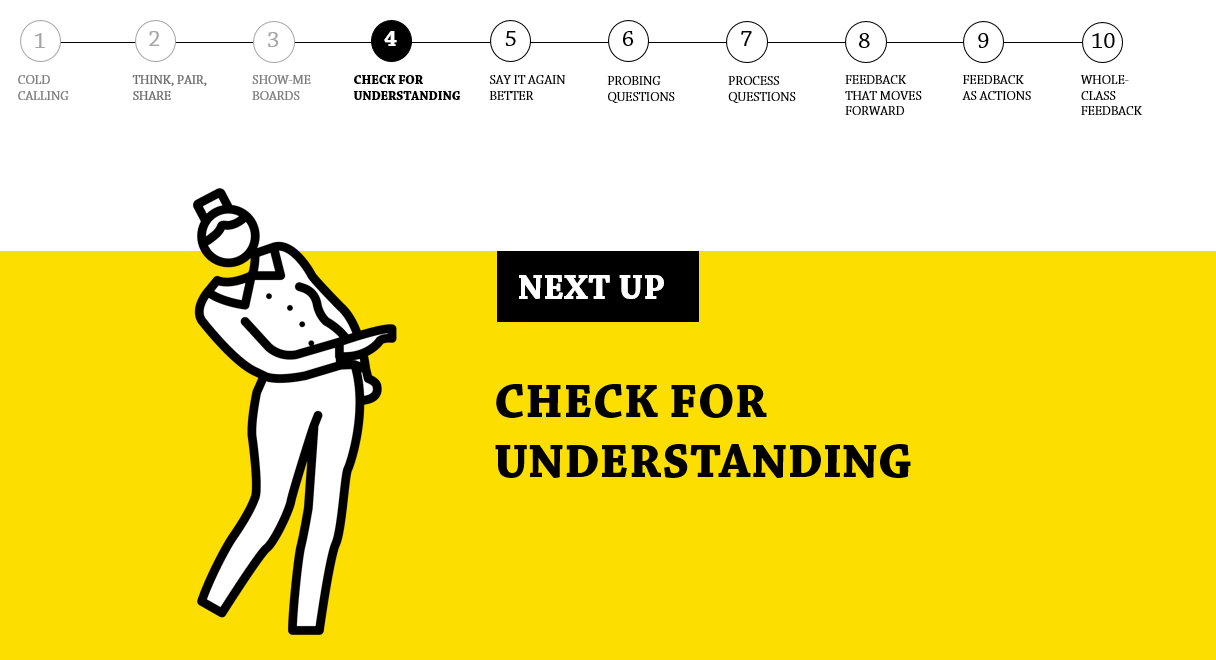21 November 2021

|
Whole School CPD Focus: |
Feedback and Questioning |
|
Walkthru Cluster: |
Feedback and Questioning |
|
Walkthru: |
‘Check for Understanding’ (page 96) plus the Teacher Workbook
|
|
Starting Point |
Questioning and Feedback - YouTube
|
|
Reflections…
‘Check for Understanding’ is one of the key approaches of the Questioning and Feedback cluster in the Walkthrus. More than this, it is the starting point of our Teaching and Learning strategy: Feedback-Plan-Teach. Our Brilliant Teaching and Learning Toolkit was founded, amongst other seminal works, on Rosenshine’s Principles of Instruction and these principles are a central idea in Sherrington’s Walkthru: ‘Check for Understanding’.
As we all know, the most effective teachers will systematically check for understanding from their students. We cannot assume that words, ideas, concepts, processes or explanations have been understood unless we test out the learning by gaining feedback from students. Once again, the ‘feedback’ starting point of our T&L strategy becomes crucial as the information gathered during this stage will inform the next steps. This may involve tackling misconceptions or even moving on more quickly to new material. ‘Check for Understanding’ renders the learning process dynamic and fluid and the ‘checking’ element ensures depth of understanding for all students.
Stage One: Cold-Call, Asking What, Not If. After teacher input, Sherrington suggests selecting one student to share their thinking with the class. ‘Jessica, what have you understood?’ This is a much more insightful question than ‘Has everyone understood?’ or ‘Jessica, do you understand?’ Jessica would now have to construct a response that shows her understanding about the question asked. This process has two purposes: it helps her embed the knowledge within her long term memory as she has to articulate it once more; it also provides useful feedback to the teacher.
Stage Two: Probe with a Short Dialogue. This is where the Walkthrus layer and overlap as approaches from the Probing Questions and Process Questions Walkthrus should be implemented at this stage too, to find out more about the student’s understanding and thought processes. ‘That’s interesting; what other reasons could there be; which of those features is most important; what would happen next; is there another way that this could be explained?’
Stage Three: Follow-Up with More Checking Dialogues. After one student has responded, Sherrington suggests selecting another student to repeat the process. After all, one student’s understanding does not provide a large enough sample to accurately inform the Feedback-Plan-Teach methodology. Sherrington recommends asking the same question or a developed version of another student, using the ideas gleaned from the previous teacher-student exchange. As with the first exchange, this should then be probed and the student should feel supported when needed. This process should be repeated so that at least three students provide feedback in this manner. If the material is more challenging, you may seek a wider range of responses.
Stage Four: Explore Differences and Details. Often, as teachers, we are so delighted to hear accurate responses from students that we possibly do not pick up on the slight nuances between answers. These nuances, Sherrington suggests, provide ‘rich material in exploring differences between student explanations’. Following the teacher’s lead, the class may select the most sophisticated answer or reflect on whether there have been misconceptions or errors. At this stage, you may also wish to flag up effective word choices used in explanations (and this would relate to the ‘Say it Again Better’ Walkthru).
Stage Five: Re-Teach, Defer or Move On. Using the feedback gathered from the previous four stages, at this point the teacher would make a decision as to whether to move on. Sherrington suggests that the teacher will evaluate whether the students have understood in sufficient depth. If they have, then it would be effective to move on or to provide more challenging questions. If they have not understood, the teacher would need to pause and go back to provide more practice or to re-teach key learning (adaptive teaching). Obviously time will also be a factor here, so it may be that the teacher has to defer the re-teaching element to a future lesson; in the meantime, students could be asked to practise independently.
So, overall, this Walkthru is fundamental to securing progress in learning. After all, if students do not KNOW the key knowledge or UNDERSTAND a process or concept, then they have not fully learnt it.
|
|
|
CPD Cascade |
RLO – Cold-Calling Reflections https://classteaching.wordpress.com/2021/10/21/reflections-on-cold-calling/
RHO – Sherrington’s Checking for Understanding 7 Principles of Effective Feedback (RHO)from Teacher Toolkit
https://www.youtube.com/watch?v=v3UazBMmwVA
Mini-whiteboard tips (RHO)https://www.johntomsett.com/2021/10/17/this-much-i-know-about-how-to-get-better-at-using-mini-whiteboards-in-your-classroom/Sexual Harassment and Gender StereotypingFree online training to tackle sexual harassment, language and gender stereotyping. https://training.ukfeminista.org.uk/
National CollegeRemember that there are subject-specific watchlists available in National College.
Useful Webinars from Creative Education (RSW)
Title: Tics and Tic Disorders: Recognising & Supporting Date: 15th of November at 4 pm UK time How to book: Register here to attend
Date: 16th of November at 4 pm UK time How to book: Register here to attend
Title: Whatever you are passionate about, it needs to include Postural Care too Date: 10th of November at 4 pm UK time How to book: Register here to attend
Title: Developing & Implementing a Relational Approach to Behaviour Date: 9th of November at 4 pm UK time How to book: Register here to attend
Using Personal Growth Plans as a Springboard for Staff Development New to the Role of Mental Health Lead |
Posted by Rachel Long
Category: Teaching and Learning Digests
